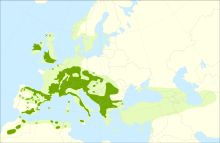Aria edulis
| Aria edulis | |
|---|---|

| |
| Scientific classification | |
| Kingdom: | Plantae |
| Clade: | Tracheophytes |
| Clade: | Angiosperms |
| Clade: | Eudicots |
| Clade: | Rosids |
| Order: | Rosales |
| Family: | Rosaceae |
| Genus: | Aria |
| Species: | A. edulis
|
| Binomial name | |
| Aria edulis (Willd.) M.Roem.
| |

| |
| Distribution map | |
| Synonyms | |
|
List
| |
Aria edulis, the whitebeam or common whitebeam,[2] is a species of deciduous tree in the family Rosaceae.
The tree often forms new shoots around the trunk. Typically compact and domed, the plant has a few upswept branches and the leaves have an almost-white underside. The hermaphrodite cream-white flowers appear in May, are insect pollinated, and go on to produce scarlet berries, which are often eaten by birds.[3]
It is native to most of Europe as well as North Africa (Algeria, Morocco, Tunisia) and temperate Asia (Eastern Turkey, Armenia, Georgia).[4] It generally favours dry limestone and chalk soils.
The cultivars A. edulis 'Lutescens',[5] with very whitish-green early leaves, and A. edulis 'Majestica',[6] with large leaves, have both gained the Royal Horticultural Society's Award of Garden Merit.[7]
The berries are edible when overripe (bletted).[8]
-
Tree
References
[edit]- ^ Rivers, M.C.; Beech, E. (2017). "Sorbus aria". IUCN Red List of Threatened Species. 2017: e.T62861A112294405. doi:10.2305/IUCN.UK.2017-3.RLTS.T62861A112294405.en. Retrieved 19 November 2021.
- ^ BSBI List 2007 (xls). Botanical Society of Britain and Ireland. Archived from the original (xls) on 26 June 2015. Retrieved 17 October 2014.
- ^ The Reader's Digest Field Guide to the Trees and Shrubs of Britain p.86.
- ^ "Aria edulis". Germplasm Resources Information Network. Agricultural Research Service, United States Department of Agriculture.
- ^ "RHS Plant Selector - Sorbus aria 'Lutescens'". Retrieved 5 March 2021.
- ^ "RHS Plant Selector - Sorbus aria 'Majestica'". Retrieved 5 March 2021.
- ^ "AGM Plants - Ornamental" (PDF). Royal Horticultural Society. July 2017. p. 98. Retrieved 13 November 2018.
- ^ Mabey, Richard (2012). Food for Free. London: Collins. p. 72. ISBN 978-000-743847-1.


